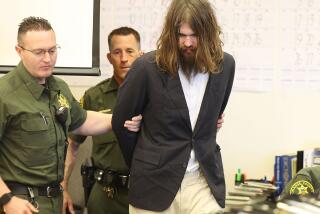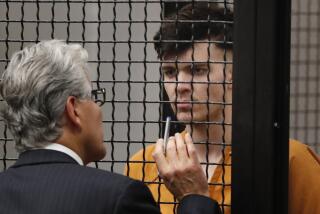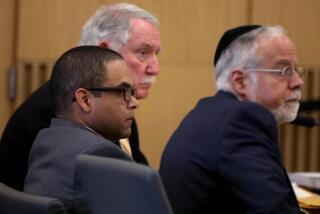What’s next for George Zimmerman?
NEW YORK — By his own lawyer’s account, George Zimmerman was dubbed “the most hated man in America” after he shot to death Trayvon Martin, an unarmed teenager. His acquittal closed the criminal case, but the moniker remains in many people’s minds, leaving Zimmerman anything but free as he tries to resume a life interrupted by a single gunshot.
A federal investigation, the threat of a civil lawsuit and the fear that those who condemn him could try to attack him or his family weigh on the 29-year-old, who has joined an undesirable club of ex-defendants with names like Casey Anthony, Bernhard Goetz and Theodore J. Briseno. All were cleared of violent crimes that riled the nation and that were far from resolved by juries declaring them not guilty in their criminal trials.
Anthony was acquitted by a Florida jury in 2011 of killing her 2-year-old daughter, Caylee; Goetz was acquitted of attempted murder and assault after he shot four teenagers on a New York subway in 1984; Briseno was one of four Los Angeles police officers acquitted in the 1991 beating of Rodney King, a verdict that sparked bloody rioting.
“In some ways, he really is imprisoned for life,” Los Angeles defense attorney Harland Braun, who defended Briseno, said of Zimmerman.
Like the LAPD officers, Zimmerman will be haunted by a case that ballooned to proportions bigger than the actual charges, Braun said. “They become symbols for society’s problems,” he said of such cases, making it difficult for those involved — defendants or plaintiffs — to move on.
“Even Rodney King was haunted by his notoriety,” Braun said of King, who successfully sued the city of Los Angeles and won $3.8 million after his beating, but drowned in his pool last year at the age of 47. “He couldn’t get arrested for drunk driving without it being a full-blown national story.”
Zimmerman is sure to face the same kind of scrutiny as those on both sides of the debate over guns and racial profiling latch onto a case that inflamed passions over everything from Florida’s “stand your ground” law — which permits deadly force without retreat if someone feels threatened with bodily harm — to hoodies.
Martin, 17, was clad in a hooded sweat shirt when he crossed paths with Zimmerman on the rainy night of Feb. 26, 2012. Zimmerman’s critics say Martin’s black skin and clothing led Zimmerman to mark the teen as a troublemaker — an image Zimmerman’s supporters insist was reasonable.
“There will be people who revile George Zimmerman forever, and there will be people who want to embrace him because they think the system worked. But his No. 1 priority is safety,” said Laurie Levenson, a professor at Loyola Law School in Los Angeles.
Zimmerman’s lead defense attorney, Mark O’Mara, underscored that on Sunday when he said that Zimmerman had “even more” reason now to carry a gun than he did on the night he killed Martin. “There are a lot of people out there who actually hate him, though they shouldn’t,” O’Mara told ABC News.
O’Mara described Zimmerman as a “pariah” who should probably leave the central Florida city of Sanford, where by day he was working as a mortgage underwriter and by night he often could be found volunteering as a neighborhood watch captain in his gated community, the Retreat at Twin Lakes.
Calls for the Justice Department to investigate the case as a civil rights crime were aired as soon as the jury on Saturday declared Zimmerman not guilty of second-degree murder and manslaughter. Atty. Gen. Eric H. Holder Jr. reiterated Monday that a federal investigation remained open, but legal experts say the chances of a federal charge being filed against Zimmerman are slim because they usually stem from acts by public officials, and because they carry a heavy burden of proof.
That leaves Zimmerman facing the specter of a civil lawsuit, if Martin’s family pursues one.
That is what happened to Goetz, who became known as the “subway vigilante” in New York after he shot the teenagers he said were trying to mug him. After his acquittal in the criminal trial, jurors in a federal civil suit filed on behalf of one of the teens found that Goetz had acted recklessly. They ordered him to pay $43 million.
“The public remembers faces and who people are,” said Barry Slotnick, who defended Goetz and who said the anger over Zimmerman’s acquittal was sure to linger. “I think George Zimmerman is going to have a very difficult time, even though he was acquitted.”
Anthony also faces a civil case following her acquittal on murder charges. It was filed by a woman who sued Anthony for defamation, claiming her life was ruined when Anthony alleged that a nanny with the same name had abducted her toddler.
As with Anthony, Zimmerman’s whereabouts are a mystery and likely to stay that way because of security concerns. The family also will have to deal with financial worries, given the challenges that Zimmerman is likely to face finding a job. In addition, Zimmerman’s wife, Shellie Zimmerman, faces trial next month on perjury charges stemming from allegations that she lied about the couple’s finances to win lower bail for her husband.
Whatever the temptation might be to tackle his looming financial woes by embarking on the talk-show circuit or signing a book deal, Levenson said it was far too early for Zimmerman to emerge from seclusion. “It’s very raw right now,” she said.
Braun, though, suggested Zimmerman could quiet his critics with a drastic move: by meeting with Martin’s parents, Sybrina Fulton and Tracy Martin. “If there were public reconciliation, that would take the sting out of it,” Braun said.
One advantage for Zimmerman is a circle of loyal friends and relatives, who for more than a year have kept his whereabouts hidden and who have insisted that he is far from the trigger-happy racist that his critics paint him to be. Zimmerman also could benefit from calls for peace following the verdict, from local and national leaders of all races and from Martin’s parents.
“We may not like the outcome of this trial, but we are united enough to say we are starting to move forward,” Sanford’s black police chief, Cecil Smith, said Monday during an event attended by the city’s white mayor, Jeff Triplett, and other officials.
“We have to because we set the tone for everyone else in this world,” Smith said. “Everyone is watching what we do.”
More to Read
Start your day right
Sign up for Essential California for news, features and recommendations from the L.A. Times and beyond in your inbox six days a week.
You may occasionally receive promotional content from the Los Angeles Times.







